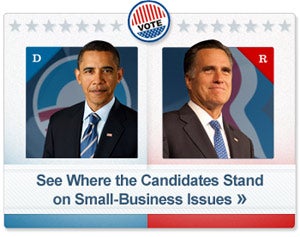Obama and Romney Get Tough on China In their final debate, the presidential candidates laid out aggressive stances on China in a debate Monday that focused on foreign-policy issues.
Opinions expressed by Entrepreneur contributors are their own.
With only two short weeks left before election day, President Barack Obama and former Governor Mitt Romney aggressively went after each other's foreign policies in their final debate Monday, including -- of particular note to entrepreneurs -- their economic positions on China.
The United States' relationship with China is a critical one for entrepreneurs, as many depend on the nation's cheap manufacturing to create their own final products. Yet for many other business owners, China – with its devalued currency and lax rules regarding intellectual property -- remains a competitive threat.
Obama called China "both an adversary but also a potential partner in the international community if it's following the rules" and vowed that he would insist the nation "plays by the same rules as everybody else" if re-elected.
 Romney took a tougher stance, saying he would declare China "a currency manipulator" on day one of his presidency. " You can't keep on holding down the value of your currency, stealing our intellectual property, counterfeiting our products, selling them around the world, even into the United States," said Romney, who also indicated that China is winning a "trade war" with the U.S. because of the trade deficit between the U.S. and China.
Romney took a tougher stance, saying he would declare China "a currency manipulator" on day one of his presidency. " You can't keep on holding down the value of your currency, stealing our intellectual property, counterfeiting our products, selling them around the world, even into the United States," said Romney, who also indicated that China is winning a "trade war" with the U.S. because of the trade deficit between the U.S. and China.
Related: In Contentious Debate, Obama and Romney Spar Over Small-Business Jobs
The final presidential debate, held in the battleground state of Florida at Lynn University in Boca Raton, touched on entrepreneurship but centered primarily on U.S. relations with Iran, Israel and Pakistan. According to the majority of polls, Obama edged out Romney for a "win" Monday night, though who wins a debate is a relatively subjective declaration.
The discussion on China came late in the 90-minute debate. Obama defended his record, saying he had set up a task force to "go after cheaters" and noted that his administration has brought more cases against China for breaking trade agreements than the previous administration in eight years.
The president also said U.S. exports to China have doubled since he took office. "Currencies are at their most advantageous point for U.S. exporters since 1993," he said. "We absolutely have to make more progress, and that's why we're going to keep on pressing."
Romney agreed that the U.S. "can be a partner with China," so long as "they're willing to be responsible." He also touched on what he considers untapped trade opportunities that exist with Latin America. "Latin America's economy is almost as big as the economy of China," he said, noting that businesses may have an easier time working with Latin America because of the less-drastic time change and use of Spanish.
In addition to talking about trade relations, Romney and Obama briefly revisited a handful of other small-business campaign issues, including the fate of "Obamacare," how small businesses should be taxed, and what constitutes a "small business."
With all four debates in the rearview mirror, are there any issues critical to small businesses and entrepreneurs that you did not hear discussed? Leave a comment below and let us know.









